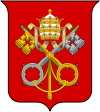- Congregation for Divine Worship and the Discipline of the Sacraments
-

This article is part of a series on the
Roman CuriaApostolic Constitution Pastor Bonus
- Doctrine of the Faith
- Oriental Churches
- Divine Worship and Discipline of the Sacraments
- Causes of Saints
- Bishops
- Evangelization of Peoples
- Clergy
- Religious
- Catholic Education
TribunalsAdministrative Services
WikiProjects- WikiProject Roman Curia
- WikiProject Catholicism
- WikiProject Vatican City
The Congregation for Divine Worship and the Discipline of the Sacraments (Congregatio de Cultu Divino et Disciplina Sacramentorum) is the congregation of the Roman Curia that handles most affairs relating to liturgical practices of the Latin Catholic Church as distinct from the Eastern Catholic Churches and also some technical matters relating to the Sacraments. Its functions were originally exercised by the Sacred Congregation of Rites, set up in January 1588 by Pope Sixtus V.
Contents
Current leadership
- Cardinal Prefect: Antonio Cañizares Llovera
- Archbishop Secretary: Joseph Augustine Di Noia, O.P.
- Undersecretary: Monsignor Anthony Ward, S.M.
History
The congregation is the direct successor of the Sacred Congregation for the Discipline of the Sacraments (Sacra Congregatio de Disciplina Sacramentorum) (1908–1969).
In 1975 it was given the title Sacred Congregation for the Sacraments and Divine Worship (Congregatio de Sacramentis et Cultu Divino) and incorporated the functions of the Sacred Congregation for Divine Worship (Sacra Congregatio pro Cultu Divino) which had been created in 1969 to take on responsibility for the liturgical affairs previously handled by the Sacred Congregation of Rites (Sacra Rituum Congregatio) (1588-1969).
For an interlude in 1984-1988 it was briefly redivided into the Congregation for the Sacraments (Congregatio de Sacramentis) and the Congregation for Divine Worship (Congregatio de Cultu Divino), under one and the same Prefect.
Functions
The Apostolic Constitution Pastor Bonus, issued by Pope John Paul II on June 28, 1988 laid down the functions of the congregation, including:
- the regulation and promotion of the liturgy, primarily of the sacraments
- the regulation of the administration of the sacraments, especially regarding their valid and licit celebration
- promoting liturgical pastoral activity, especially regarding the celebration of the Eucharist
- the drawing up and revision of liturgical texts
- reviewing particular calendars and proper texts for the Mass and the Divine Office
- granting the recognitio to translations of liturgical books and their adaptations
- promoting the liturgical apostolate or sacred music, song or art
- ensuring that liturgical norms are accurately observed, and that abuses are avoided and eliminated where they are found to exist.
- examining the fact of non-consummation in a marriage and the existence of a just cause for granting a dispensation.
- examining cases concerning the nullity of ordination.
- regulating the cult of relics, the confirmation of heavenly patrons and the granting of the title of minor basilica
- giving assistance to bishops so that the prayers and pious exercises of the Christian people may be fostered and held in high esteem
On August 30, 2011, Pope Benedict XVI issued the Motu Proprio Quaerit Semper[1] which modifies the competency of the congregation by taking away responsibility for unconssumated marriages and nullity of ordination cases. According to the Motu Proprio, this was done because "In these circumstances, it appeared adequate that the work of the Congregation for Divine Worship and the Discipline of the Sacraments be dedicated essentially [potissimum] to a resumption of the Sacred Liturgy in the Church, according to the renewal that the Second Vatican Council desired, beginning with the Constitution Sacrosanctum Concilium."[2]
Cardinal Prefects
- Domenico Ferrata (1908–1914)
- Filippo Giustini (1914–1920)
- Michele Lega (1920–1935)
- Domenico Jorio (1935–1954)
- Benedetto Aloisi Masella (1954–1968)
- Francesco Carpino (7 Apr 1967 - 26 Jun 1967)
- Francis James Brennan (1968)
- Antonio Samoré (1968–1974)
- James Knox (1974–1981)
- Giuseppe Casoria, (pro-prefect 1981-1983, prefect 1983-1984)
- Paul Mayer (pro-prefect 1984-1985, prefect 1985-1988)
- Eduardo Martínez Somalo (1988–1992)
- Antonio María Javierre Ortas (1992–1996)
- Jorge Arturo Medina Estévez (pro-prefect 1996-1998, prefect 1998-2002)
- Francis Arinze (2002–2008)
- Antonio Cañizares Llovera (2008- )
Secretary
- Domenico Sorrentino (2003–2005)
- Malcolm Ranjith (2005–2009)
- Joseph Augustine Di Noia (2009-)
Vox Clara commission
The congregation is also assisted by the Vox Clara commission (or committee) responsible for the translation of Latin texts into English. This commission was established during 2001 to supervise the work of ICEL on the new Roman Missal until the text was submitted to them in 2008.
Vox Clara met several times a year for three days at a time.
Its current president is the archbishop of Sydney, Cardinal George Pell, and its secretary is the archbishop emeritus of Westminster, Cardinal Cormac Murphy-O'Connor.
See also
- Musicam Sacram
- Roman Catholic Church
- Notitiae, the congregation's official journal
References
- ^ "Quaerit Semper". http://www.vatican.va/holy_father/benedict_xvi/motu_proprio/documents/hf_ben-xvi_motu-proprio_20110830_quaerit-semper_lt.html.
- ^ [http://rorate-caeli.blogspot.com/2011/09/motu-proprio-quaerit-semper.html "Motu Proprio "Quaerit semper", transferring competences on the discipline of the Sacraments from the CDW to the Rota. / Reform of the Reform: CDW now dedicated essentially to Sacred Liturgy"]. Rorate Caeli. http://rorate-caeli.blogspot.com/2011/09/motu-proprio-quaerit-semper.html.
External links
Wikimedia Foundation. 2010.
